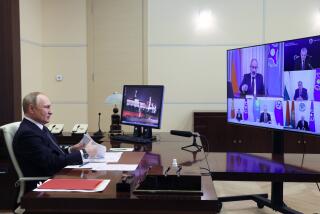U.S. Offensive Won’t Wait for Politics
- Share via
MOSCOW — Secretary of Defense Donald H. Rumsfeld said Friday that the United States has not muted and will not mute the military campaign in Afghanistan to give opposition leaders time to form a political coalition acceptable to American interests.
“I don’t think it’s possible to manage the work on the ground, the war campaign on the ground, against a political timetable that’s unpredictable,” Rumsfeld told reporters accompanying him to Moscow.
“For us to sit around and say, well, we are smart enough that maybe we can delay this so this happens instead of that . . . is ridiculous. We have not done that in the past, we are not doing it now and we do not intend to do it in the future.”
Rumsfeld confirmed that among the anti-Taliban leaders who have received help from the U.S. is Hamid Karzai, a Western-oriented tribal leader who entered Afghanistan to organize resistance to the Taliban. Rumsfeld said the U.S. sent supplies including food, water and ammunition to Karzai on Thursday. He said the U.S. does not have military personnel with Karzai and his supporters, but he hinted that the Pentagon plans to send someone to accompany Karzai at the first opportunity.
Arriving here today for talks with senior Russian officials on missile defense, nuclear force reductions and the war on terrorism, Rumsfeld said it remains to be seen how President Vladimir V. Putin’s new cooperative relationship with Washington will affect strategic negotiations on missile defense and the Antiballistic Missile Treaty.
But Rumsfeld, in remarks to reporters on his plane en route to Moscow, said Putin’s immediate offer of assistance after the Sept. 11 terrorist attacks on New York and near Washington established him as a leader willing to work “with the West and the rest of the world to help us deal with this terrible problem.”
Rumsfeld’s trip comes in advance of President Bush’s summit with Putin in the United States 10 days from now. U.S. and Russian officials say they are hopeful that the two leaders can announce a new strategic “understanding” that would allow the Pentagon to pursue extensive missile defense testing without scrapping the ABM accord.
With two former Soviet republics that border Afghanistan--Uzbekistan and Tajikistan--now providing assistance to U.S. military forces waging the military campaign against the ruling Taliban militia, Rumsfeld added on to his Moscow trip to strengthen contacts with leaders in those countries.
He is scheduled to travel to both former Soviet republics later today. He will travel Sunday to Pakistan, a key ally bordering Afghanistan, and then to India. He is scheduled to return to Washington on Monday night.
Rumsfeld denied reports that the Pentagon and the State Department have been at odds over how the war is being waged. He said that the two agencies have been encouraging opposition forces within Afghanistan to form a provisional government, but that those discussions have not slowed military action in the region or affected battle strategy.
“We are going forward as rapidly as is humanly possible to see that the war on the ground is prosecuted as effectively as can be done, and we are putting people in there as fast as we can to provide the kind of liaison assistance that we believe will be helpful,” Rumsfeld said.
On the subject of the arms control talks in Moscow, Rumsfeld said his announcement last week that the Pentagon had postponed several missile defense tests that might have violated the accord was designed to show that the treaty has become an impediment to the administration’s ambitious missile defense agenda. He said it was not a conciliatory nod to Russia, as it has been portrayed.
“I’m not suggesting we delay withdrawal from the treaty,” Rumsfeld said. “All I have said publicly on the subject is what the president has said: We need to set the treaty aside and establish a new relationship between the United States and Russia. . . . The president has said we will deploy missile defense. That can’t be done with a treaty there that’s an impediment.”
More to Read
Get the L.A. Times Politics newsletter
Deeply reported insights into legislation, politics and policy from Sacramento, Washington and beyond. In your inbox twice per week.
You may occasionally receive promotional content from the Los Angeles Times.










